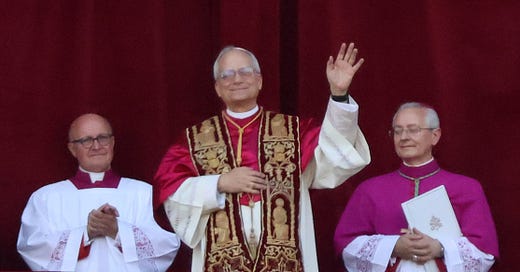Two Recent Popes Agree, Listening to the Congregation is Important
What is synodality and how does it work?
By far the biggest headline of the past week was the election of a new pope to lead the Roman Catholic Church, Pope Leo XIV. The white smoke rising is an exciting moment not only for Catholic Christians but for the whole world. There’s even a new pope baseball card!
With Pope Leo’s election has come much speculation about what kind of pope he will be. As I listened to my favorite podcast, The Daily, their coverage of the new pope included an awesome, nerdy church word, synodality. In his first address as pope, Pope Leo said he would continue Pope Francis’ focus on synodality. It’s not every day the New York Times biggest story includes niche ecclesiology.
So What is Synodality?
I’ll start by saying (especially to my new readers), I am not a Catholic and therefore not an expert in Catholic church polity. I have a hard enough time keeping up with United Methodist church polity. However, I’m not going to miss a prime opportunity to nerd out on synodality, so be gracious with me in the comments if I am a little off.
The Greek roots of the word synod are syn (together) and hodos (journeying). At its core synodality is journeying together. In church history, a synod is a meeting or assembly of church leaders to discuss important matters pertaining to the church. My Lutheran friends love a good synod (who doesn’t?). Synodality is a little different, it’s a word that describes a way of being the church, one in which each member’s voice is valuable, because the Holy Spirit speaks to all.
Pope Francis’ Building Blocks of Synodality
Pope Francis gave an excellent overview of synodality in his address at the opening of the second session of the 16th Ordinary Assembly of the Synod of Bishops. Here are a few of the building blocks of synodality described in his address:
Synodality is built on the foundation of the Holy Spirit. He says, “The Holy Spirit is a trusty guide, and our first task is to learn to distinguish his voice, because He speaks in everyone and in all things.” Synodality is essential because everyone can hear the voice of God.
Synodality helps the church understand itself better. He states, “The synodal process is also a learning process, in the course which the Church gets to know herself better and to identify the most suitable forms of pastoral action for the mission her Lord entrusts to her.” The bigger the institution of the church gets, the harder this becomes. Synodality helps those in power to hear the voices of the whole church more clearly and discern how the church should gather and be sent out in mission.
Synodality creates a balanced relationship between clergy and laity. Pope Francis states, “The manifestation and identification of this inclusive understanding of episcopal ministry needs to avoid two dangers: first, an abstract approach which ignores the fertile concreteness of places and relationships and the value of each individual; second, pitting hierarchy and faithful against each other in a way that fractures communion.” Synodality allows both clergy and laity to have a voice and to hear each other’s voices in the work of the church. If your denomination is anything like mine, this work is desperately needed!
How does synodality work?
Listening is at the heart of synodality. The Catholic Project gathered some resources for listening sessions that can be found here. One of these resources is from the Vatican and suggests churches invite their members to tell their stories, to create art, and to read scripture together as a way of giving voice to all.
In my Spiritual Listening Plan, the middle column has a series of activities that focus on listening to your congregation. Activities like a congregational survey, a focus group, a document review, and a historical review help you to listen deeply to the dreams and passions of your congregation. I included these activities because I too believe that the Holy Spirit speaks to everyone in the church, not just the pastor or the administrative council.
Conclusion:
Thanks for humoring me on this quick but nerdy exploration of an obscure church word. I’ll close this newsletter with one last word from Pope Francis on synodality:
“Journeying together with everyone - everyone, everyone together, is a process in which the Church, submitting to the action of the Holy Spirit, and sensitive enough to capture the signs of the times, continually renews herself and perfects her sacramental nature, in order to be a credible witness of the mission to which she is called, to unite all peoples into the one people awaited at the end, when God Himself will ask us to be seated at the banquet prepared by Him.”
Let it be so!





Thinking about the teaching Tim Mackie (of The Bible Project) has published on The Exodus Way. He talks about being brought out of (the road out of) and then the road or journey through and the journey into…I’m still listening, so my thoughts aren’t complete either. But, it’s interesting to think of the Israelites’ forty years of wandering in the dessert as “Synod.” Ours (as Christians) is journey shaped by struggle, suffering, even wandering. Of being brought out of slavery and (increasingly) into sonship. It requires us to take up our cross (like his Son). I appreciate how a ministry of listening MUST be a part of this journey through…
Anyway: thankful for your clear thoughts. I hope my snippets of thoughts aren’t too jumbly to add to the mix.